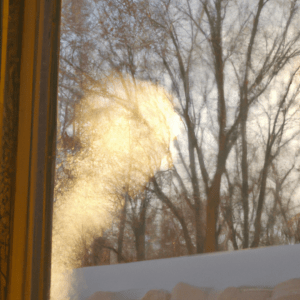Emergency HVAC Tips for Breakdowns Part 1: Stay Warm Under Pressure
 HVAC systems ensure that we can enjoy our spaces when there is unpredictable weather outside. The inconvenience of HVAC breakdowns can disrupt our routines and turn our homes into an uncomfortable space. Imagine the frustration of shivering in the cold due to a faulty HVAC system. The inconvenience goes beyond discomfort, as these breakdowns can lead to increased energy bills and potential health hazards.
HVAC systems ensure that we can enjoy our spaces when there is unpredictable weather outside. The inconvenience of HVAC breakdowns can disrupt our routines and turn our homes into an uncomfortable space. Imagine the frustration of shivering in the cold due to a faulty HVAC system. The inconvenience goes beyond discomfort, as these breakdowns can lead to increased energy bills and potential health hazards.
Regular maintenance and timely repairs are crucial to ensuring the smooth functioning of HVAC systems, underscoring the importance of staying proactive in caring for these essential components of our indoor comfort. In understanding both the significance of HVAC systems and the inconvenience of their breakdowns, we empower ourselves to create and maintain environments that support our well-being and enhance our daily lives.
Signs of an HVAC Emergency
Your home’s heating, ventilation, and air conditioning system quietly work behind the scenes to keep you comfortable.
Yet, when signs of an HVAC emergency emerge, being able to recognize them is crucial.
Unusual noises, such as banging or screeching, emanating from your HVAC unit could indicate a serious issue. These sounds may point to problems with the motor, blower, or other essential components that demand immediate attention.
Another key indicator of an HVAC emergency is a sudden and noticeable decrease in performance.
If your system struggles to cool or heat your home as effectively as before, it might be a sign of a malfunction. Additionally, if you detect unusual odors, like burning or mustiness, it’s wise to investigate promptly. Identifying these signs early on can help prevent a minor issue from turning into a major breakdown, ensuring your HVAC system functions efficiently and reliably.
Immediate Steps in an HVAC Emergency
When faced with an HVAC emergency, swift and decisive action is key to minimizing damage and restoring comfort to your home.
The first immediate step is to turn off your HVAC system. Locate the emergency shut-off switch, often found on the unit itself, and power it down to prevent any further issues. This important step can help avoid worsening the problem and potentially causing more damage.
After shutting off the system, assessing the situation is the next priority. If there’s a visible issue, such as a leaking pipe or a malfunctioning component, take note of it. While some problems may be resolved with DIY solutions, it’s essential to recognize when professional help is required.
For any complex or potentially hazardous issues, contacting a qualified HVAC technician is the safest and most effective course of action. Taking these immediate steps can help mitigate the impact of an HVAC emergency, ensuring a quicker resolution and a return to a comfortable home environment.
DIY HVAC Troubleshooting
Common problems like uneven heating or cooling, strange noises, or a sudden spike in energy bills might have simple solutions you can handle yourself.
Check your air filters regularly, as a clogged filter can strain your system’s efficiency. Additionally, inspect your thermostat settings and make sure they align with your comfort needs. Sometimes, adjusting vents or cleaning debris around the outdoor unit can address airflow issues and restore balance to your system.
Regular cleaning and maintenance are also fundamental to keeping your HVAC system running smoothly. Dust and debris accumulation can hinder performance, so make it a habit to clean vents, coils, and fans. Clearing these components helps your system operate efficiently and extends its lifespan. However, while DIY troubleshooting is useful, it’s crucial to prioritize safety. Before attempting any repairs, turn off the power to your HVAC system and follow proper safety precautions.
For more complex issues or if you’re uncertain about a fix, consulting a professional HVAC technician ensures that your system receives the care it needs without compromising your safety.
When to Call for Professional Help
Unusual sounds, inconsistent temperatures, or a sudden spike in energy bills are red flags that something might be wrong.
Ignoring these signs could lead to more significant issues down the road, making it crucial to address problems promptly. If your system is exhibiting any of these warning signs, it’s time to seek the expertise of a reliable HVAC technician.
Finding a trustworthy HVAC technician is a crucial step in maintaining the health of your system.
Look for technicians with proper certifications and licenses (Like all of our Jacobs and Rhodes professionals have), ensuring they meet industry standards. Prepare for the service call by gathering essential information about your HVAC system. Note the make and model, and be ready to describe the issues you’ve observed. This proactive approach not only streamlines the repair process but also ensures a more accurate diagnosis, setting the stage for a successful resolution to your HVAC concerns.
Conclusion
The importance of a properly working HVAC system cannot be overstated, offering not just comfort but also contributing to our overall well-being by filtering out pollutants.
However, the inconvenience of HVAC breakdowns is a stark reminder of their significance. These malfunctions can disrupt our daily lives, turning our homes into uncomfortable spaces and potentially leading to increased bills and health hazards.
Whether facing an HVAC emergency or employing temporary solutions for comfort, the key is recognizing signs, taking immediate steps, and knowing when to call for professional help.
DIY troubleshooting can be handy, but safety should always be a priority. As homeowners navigate these challenges, it becomes evident that regular maintenance is the key factor to preventing future emergencies.
Creating a maintenance schedule and investing in routine check-ups contribute to the longevity and efficiency of HVAC systems.
Moreover, keeping an emergency kit ready helps you be prepared for unforeseen circumstances. Understanding the double-sided nature of HVAC systems, recognizing their essential role in our daily lives, and being aware of the challenges they may pose if not working correctly empower us to establish comfortable, durable, and eco-friendly living environments.

 Jacobs and Rhodes
Jacobs and Rhodes